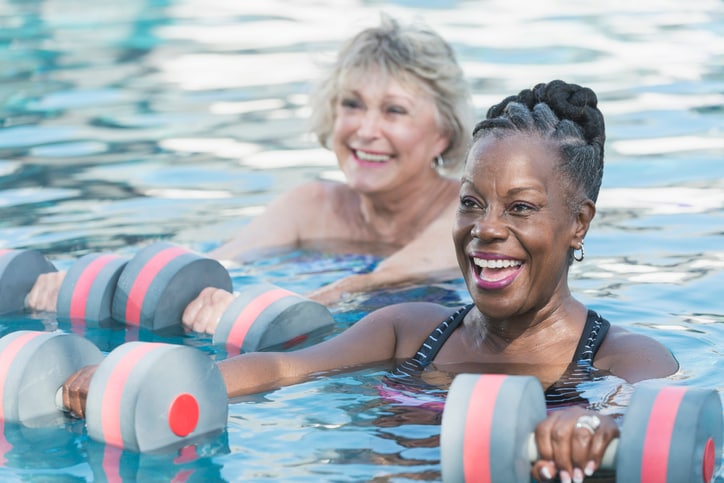In this article
- What is the best sleeping temperature for seniors?
- What is the recommended room temperature for seniors?
- Why is temperature important for seniors?
- What conditions impact seniors’ ability to regulate body temperature?
- Why are extreme temperatures harder for seniors to navigate?
- Tips for staying warm or cool
- The bottom line
We often don’t give much thought about the temperature at which we keep our homes. But if you are an older adult or caring for an older adult, questions about room temperature may be on your mind. Finding the right room temperature for seniors is vital.
“Seniors have a reduced ability to sense and adapt to temperature changes, which can lead to discomfort or more severe risks like hypothermia or heatstroke,” says Dr. Monica Mahajan, medical director at The Center for Better Aging in Chicago. “Maintaining appropriate room and sleep temperatures supports quality rest, which is essential for cognitive health, mood stability and immune function.”
Here, we’ll go over everything you need to know about the best room and sleeping temperatures for seniors for seniors, including why room temperature is an important consideration, health conditions that affect senior body temperature and some tips for regulating temperature in seniors.
What is the best sleeping temperature for seniors?
Most people prefer to have their sleeping space at slightly different temperatures than our daytime space. Not only that, but blankets and pillows can change your body temperature. Christopher Norman, a board certified geriatric nurse practitioner for the National Council on Aging, recommends lowering your room’s temperature a little overnight.
“At night, it’s a good idea to lower the temperature to around 65-70 degrees Fahrenheit to help stay comfortable with the body’s natural drop in temperature, making it easier to get a good night’s sleep,” he explains.
Whenever possible, it’s also good to check on your loved one at night to see if they seem too hot or too cold, especially if they are less able to share this with you themselves, such as in the case of dementia.
What is the recommended room temperature for seniors?
Overall, it’s best for seniors to keep their rooms between 68 and 74 degrees Fahrenheit during the day, says Mahajan. “Seniors have a higher sensitivity to temperature changes due to age-related physiological shifts, making this range essential for comfort and reducing health risks,” she explains.
“The reduced ability to regulate their own body temperature means that seniors can often be colder, so having it on the higher end (around 74°F) tends to be the most comfortable.”
— Barbara Sparacino, adult and geriatric psychiatrist and founder of The Aging Parent Coach
Barbara Sparacino, a board-certified adult and geriatric psychiatrist and founder of The Aging Parent Coach, agrees with these guidelines, adding that keeping the room temperature a little on the high side might actually make the most sense. “The reduced ability to regulate their own body temperature means that seniors can often be colder, so having it on the higher end (around 74°F) tends to be the most comfortable,” she says.
Above all, keeping things too cold is something to avoid, Sparacino says. “When the room is chilly, you need to exert more energy just to keep warm,” she explains. “This can tire out your immune system, leaving seniors more open to catching things like colds or the flu.” As Sparacino notes, aging adults tend to have weaker immune systems to begin with, so straining their bodies this way is something to avoid.
Why is temperature important for seniors?
For seniors, temperature isn’t just about comfort. Not paying attention to room temperature can have real health consequences. As we age, certain aspects of our body change, says Norman. This includes the following:
- We sweat less.
- Blood vessels get less flexible because there’s less blood circulation to the skin.
- We have less insulation (fat) in our skin.
- The part of the brain responsible for temperature regulation (the hypothalamus) becomes less sensitive to changes.
All of these factors increase the risk of health problems, especially in extreme weather, says Norman. “To make up for the changes in our internal controls, we can use the environment to help maintain a proper room temperature, thus preventing health issues and providing for optimal sleep quality, both of which are great for overall well-being,” he explains.
What conditions impact seniors’ ability to regulate body temperature?
There are several health conditions common to seniors that may make it more difficult for them to regulate their body temperature, Sparacino says. These include:
- Diabetes: can damage blood vessels and nerves, reducing your capacity to sense temperature changes and impairing blood flow.
- Thyroid disorders: can reduce heat production and make you more susceptible to feeling cold.
- Cardiovascular diseases: can limit blood flow, strain the heart and leave older adults more vulnerable to cold stress or heat exhaustion.
“I have seen those with dementia sit calmly in chilly rooms, not realizing they’re too cold, or even put on extra layers in warm environments.”
— Barbara Sparacino
Additionally, Sparacino says, certain neurological diseases common in older adults can affect temperature perception and expression.
“Dementia or Alzheimer’s disease for example, can alter the brain’s signaling, making it harder for seniors to perceive and communicate discomfort due to temperature,” she says. “I have seen those with dementia sit calmly in chilly rooms, not realizing they’re too cold, or even put on extra layers in warm environments.”
Beyond these conditions, sometimes medications seniors take impact body temperature regulation. Some medications “impair sweating or other temperature-regulating body responses, complicating the ability to stay comfortable,” says Norman.
In particular, medications like beta-blockers or diuretics may impair your body’s natural temperature responses, says Mahajan. Also, poor nutrition can play a role in temperature regulation, as can a history of stroke. Conditions affecting the spine may also impair body temperature regulation, according to Norman.
Why are extreme temperatures harder for seniors to navigate?
Extreme temperatures outside — from subzero temperatures in winter, to extreme heat during summer days — can have strong impacts on seniors. “Older adults are more likely to suffer in extreme temperatures because their bodies are less efficient at regulating temperature, and they may not perceive temperature changes as well,” Norman says.
As a result, seniors are especially at-risk for heat stroke or hypothermia. Chronic illnesses or some medications can make these conditions worse.
It’s important to check in on loved ones during extreme temperatures, not only to make sure they have what they need to stay comfortable and safe, but also to ensure their home environment is able to keep them at a healthy temperature.
Tips for staying warm or cool
Sparacino shared some helpful tips for seniors when it comes to staying at a healthy temperature.
Wear layers
“Wearing layers is one of the easiest ways to stay warm,” Sparacino shares. “It helps to have extra clothing available to seniors that is in reach and can easily be put on themselves.” Consider items like extra socks, scarves, hats and long sleeve shirts.
Stay active
Staying active is a great way to increase circulation, which can help someone stay warm. “If possible, it helps to go on walks when it’s warmer, do simple exercises at home and to keep moving as much as possible,” Sparacino suggests.
Stay in the shade
“When outside, I recommend staying in the shade as much as possible,” Sparacino advises. Doing this helps ensure you don’t overheat and that you stay at a comfortable temperature for your body.
Stay hydrated
It’s vital that seniors stay adequately hydrated. “Staying hydrated helps to regulate body temperature and also ensures you don’t become dehydrated,” says Sparacino.
What if it’s challenging to get enough hydration? “If water isn’t always easy to remember to drink, it also helps to have things like popsicles and fruit around, as they have a higher amount of fluid,” Sparacino recommends.
The bottom line
Keeping room temperature between 68 and 74 degrees Fahrenheit is your best bet when you are looking to promote comfort, health and well being for yourself as a senior or for a senior loved one. At night, it’s best to keep the temperature on the lower end of that range.
In addition to monitoring indoor temps, you should be aware of extreme heat or cold warnings, as seniors are more vulnerable to extreme temperature changes than their younger cohorts. Above all, remember that it takes a village to keep a senior healthy and safe. It’s important for seniors to have a social safety net, Norman concludes. Friends, family, neighbors or caregivers should regularly check in on their loved ones to ensure that living conditions remain safe and comfortable, he emphasizes.
If you have further questions about the best room temperature for you or your loved one — especially if you have concerns about how a health condition or medication may be impacting body temperature — reach out to a medical provider for more info.





